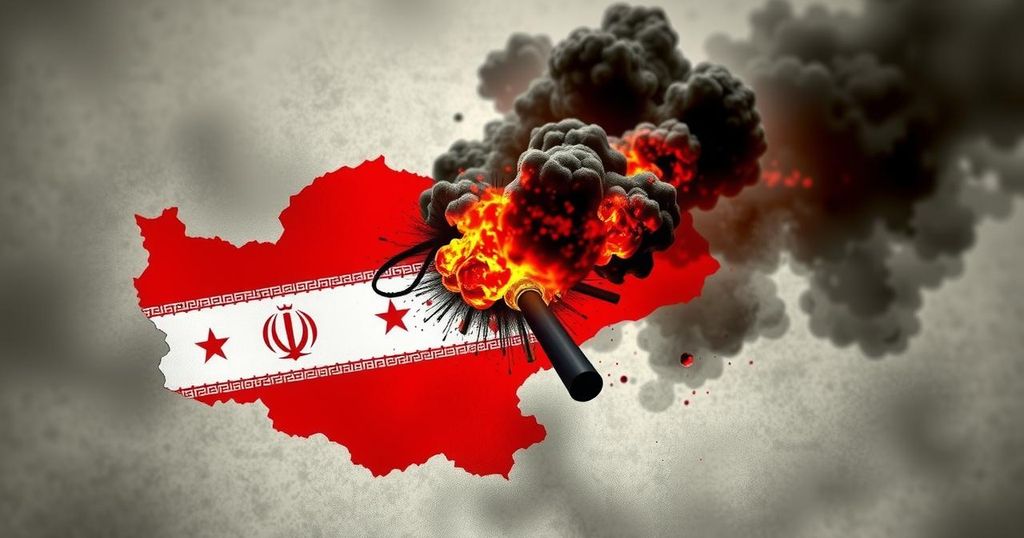Iran has expressed support for Bashar al-Assad amid an intensified offensive by opposition forces but has yet to mobilize troops significantly. Iranian officials emphasize geopolitical conspiracies involving foreign backing of the opposition while navigating tensions with Turkey. The situation is seen as a careful balance between potential military intervention and ongoing reliance on proxy forces.
In the midst of Syria’s escalating conflict, Iran has reaffirmed its support for President Bashar al-Assad while indicating the possibility of sending troops into Syria if necessary. During recent diplomatic discussions in Qatar, Iran’s Foreign Minister Abbas Araghchi emphasized the necessity for a political dialogue between the Syrian government and what he termed “legitimate opposition groups.” Although Iranian officials have suggested a potential military intervention, there are no signs of significant troop mobilization on the ground, reflecting Iran’s cautious approach amid the complexities of regional politics and ongoing tensions with Israel.
As opposition forces, led by Hayat Tahrir al-Sham (HTS), launch a major offensive from Idlib, the Iranian government maintains that these armed groups are part of a broader foreign-backed conspiracy aimed at destabilizing the region. This assertion aligns with Tehran’s narrative that the rebels are supported by Western powers, particularly the United States and Israel, which Iran claims could lead to broader regional instability.
In a striking shift, Iranian state media have begun to refer to the opposition as “armed groups” instead of “terrorists,” signaling a potential recalibration in Iran’s public stance amid geopolitical pressures. The situation remains fluid, as the Iranian foreign ministry downplayed reports of any troop withdrawals and emphasized contentions that regional fighting could escalate if not managed prudently.
Furthermore, tensions between Iran and Turkey have intensified regarding Turkey’s support for Syrian opposition forces, particularly as Turkish President Recep Tayyip Erdogan expresses his ambitions for military action in northern Syria. Iranian analysts are observing this development closely, suggesting that the current conflict is driven less by ideological components than by geopolitical interests, including Turkey’s aim to curb Iranian influence in the region.
While Iranian leadership contemplates potential military involvement, the historical reliance on proxy forces remains apparent. The Iranian government has faced criticism for not taking decisive action to support al-Assad more robustly, with some lawmaker voices cautioning that a failure to act could result in significant regional repercussions, including the loss of critical allies like Lebanon and Iraq.
Overall, the current trajectory of the Syrian conflict poses a complex challenge for Iran as it balances its strategic interests against the backdrop of shifting alliances and ongoing security threats posed by its adversaries.
The Syrian conflict, which began in 2011, has seen numerous shifts in alliances and strategies as various domestic and international actors have become involved. Iran has historically supported the Assad regime, viewing it as a crucial ally in its regional strategy to counter Western influence, particularly that of the United States and Israel. The rise of militant groups such as Hayat Tahrir al-Sham has complicated the dynamics of the conflict, as Turkey’s engagement and support for these groups presents a direct challenge to Iran’s interests in the region. The involvement of Iranian forces has largely been through proxies and military advisors rather than direct troop deployments, although the current escalation in Syria raises questions about potential changes in this strategy.
Iran’s involvement in Syria continues to be shaped by a multitude of geopolitical factors, including its relationships with Russia and Turkey, as well as the behavior of armed opposition groups. While Tehran’s leadership hints at a possible direct military intervention, the realities on the ground suggest a continuation of its reliance on proxy forces. The complex landscape of the Syrian conflict is further complicated by the ongoing regional rivalries, particularly with Turkey’s aspirations and the persistent threat of Israeli military action. Iran’s strategy moving forward will likely focus on maintaining its influence while mitigating risks associated with increased direct military engagement.
Original Source: www.aljazeera.com







